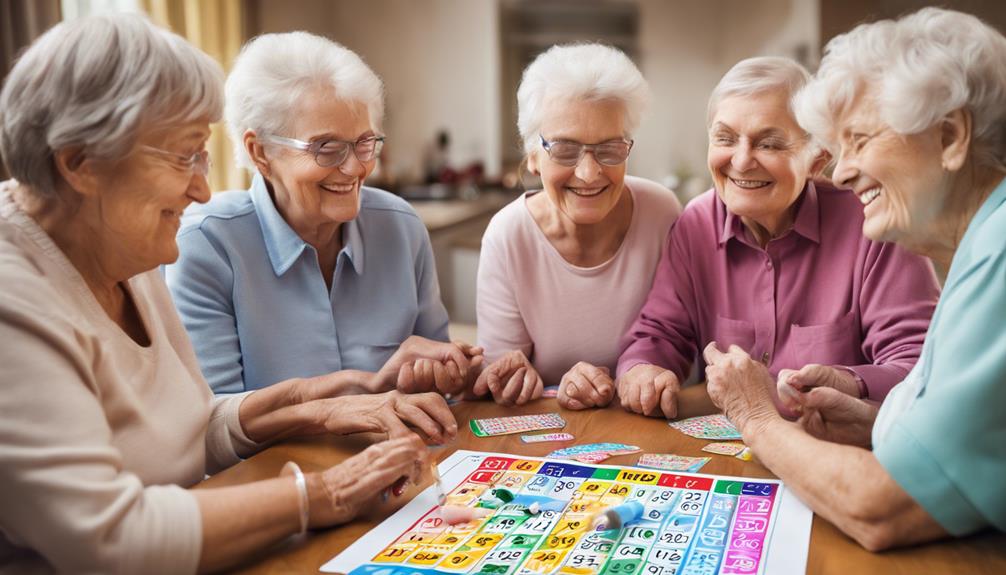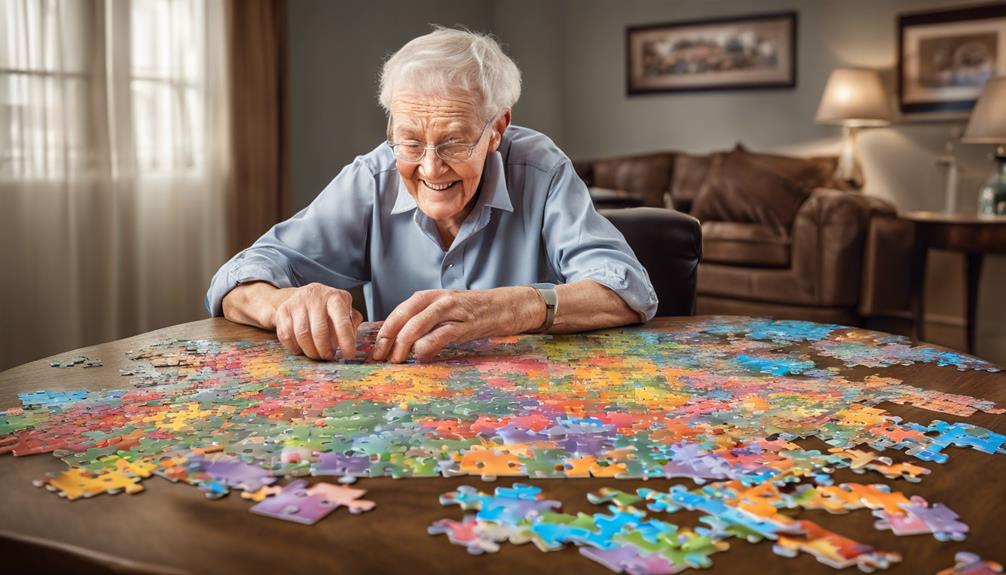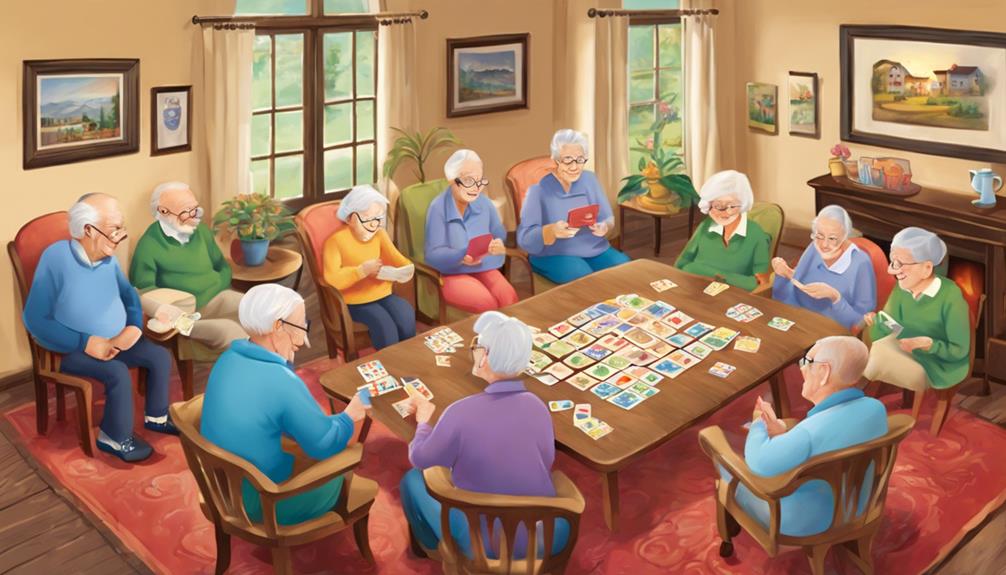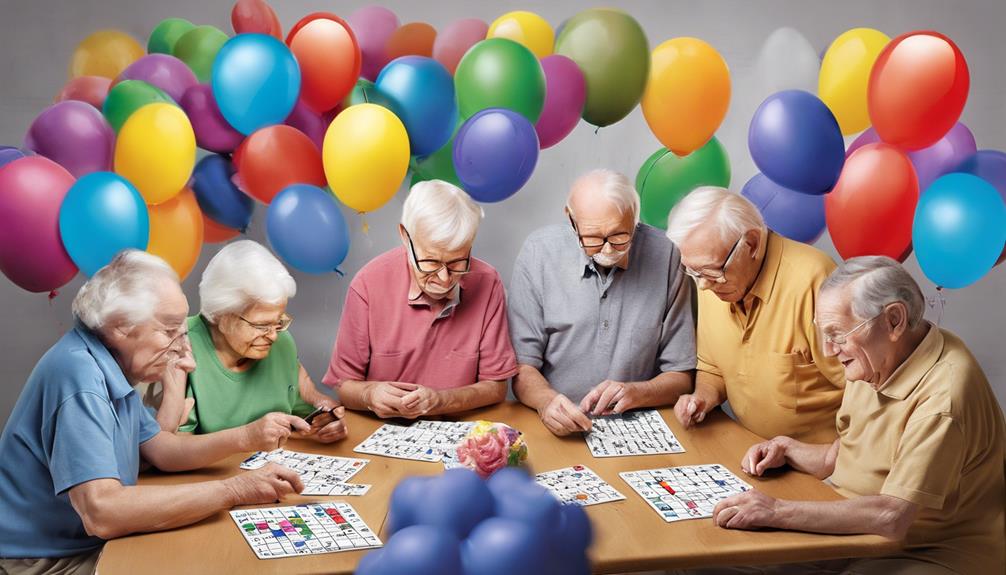As we explore the intricate path of memory care, we discover the precious treasures found in the world of cognitive health and happiness for those with dementia.
The power of tailored games and engaging activities transcends mere recreation; it becomes a key to unlocking cherished memories and fostering a sense of connection.
Through the lens of these games, we witness a transformation taking place – a journey towards enhanced cognitive well-being and moments infused with pure joy.
Join us as we explore the profound impact of memory care games and the possibilities they hold for those we care for.
Key Takeaways
- Games aid cognitive health and joy in dementia care.
- Personalized games benefit memory and social well-being.
- Tailoring activities to individual needs enhances engagement.
- Family involvement strengthens bonds and fosters connection.
Understanding Dementia and Cognitive Decline
In our journey to comprehend dementia and cognitive decline, we navigate through the intricate web of symptoms that affect many seniors, such as forgetfulness and thinking difficulties. These challenges can significantly impact daily life and require specialized care and attention. Understanding the complexities of dementia is crucial in providing the best support for individuals facing these difficulties. While there's currently no cure for dementia, there are ways to enhance the quality of life for those affected.
Memory care games play a vital role in this aspect. These games are designed to stimulate cognitive functions, improve memory recall, and enhance mental skills. By engaging individuals with dementia in these activities, we can help them maintain their cognitive abilities for longer periods. It's essential for memory care centers to focus on providing engaging games and activities that promote cognitive stimulation and overall mental health. Through these efforts, we can offer not only care but also moments of joy and fulfillment to those battling dementia.
The Role of Games in Memory Care

Navigating the intricacies of dementia and cognitive decline, we witness the profound impact that memory care games have on individuals' mental acuity and emotional well-being. Memory care activities play a crucial role in enhancing cognitive stimulation and emotional well-being in seniors with dementia. Here's how these games contribute to the overall well-being of individuals in memory care:
- Cognitive Stimulation: Memory games for seniors help maintain cognitive functions and slow down cognitive decline.
- Social Interaction: Games in memory care settings promote social engagement, reducing feelings of isolation and enhancing emotional well-being.
- Family Involvement: Involving family members in memory care games strengthens bonds, provides emotional support, and fosters a sense of connection.
- Tailored Experiences: Tailoring games to match the individual's dementia stage ensures safe and engaging experiences, optimizing cognitive benefits.
- Emotional Well-being: Engaging in memory care activities evokes positive memories, boosts mood, and improves the overall well-being of individuals with dementia.
Through tailored experiences, social interaction, and family involvement, memory care games create a supportive environment that nurtures cognitive functions and emotional health.
Types of Games and Their Benefits
Exploring the diverse array of games available can provide valuable cognitive and emotional benefits for individuals in memory care. Card games are excellent for memory recall and improving hand-eye coordination, offering enjoyable ways to engage with others.
Memory games specifically target memory function, enhancing cognitive abilities while providing mental stimulation. Word games, such as crossword puzzles, play a vital role in maintaining language skills and fostering critical thinking in dementia care.
Jigsaw puzzles are beneficial for improving hand-eye coordination and engaging cognitive activity. Electronic games introduce new avenues for stimulating the brain and offering cognitive benefits to seniors in memory care settings.
Each type of game contributes uniquely to the overall cognitive health and joy of individuals in dementia care, promoting social interaction and mental acuity. By incorporating a variety of games, we can cater to different interests and abilities, creating a holistic approach to enhancing cognitive abilities in memory care.
Choosing the Right Game

Considering the individual's dementia stage is crucial when selecting memory care games to ensure optimal engagement and cognitive stimulation. Personal preferences play a significant role in guiding the choice of games, guaranteeing they aren't only beneficial but also enjoyable for seniors with dementia.
When adapting games for those with severe dementia, simplify rules, use larger game pieces, and focus on sensory aspects to make them accessible and engaging. It's essential to ensure that the selected games are safe, comfortable, and well-suited for the cognitive and physical abilities of the individual.
Tailoring memory care games to match the cognitive and sensory needs of the dementia patient can provide maximum therapeutic benefits and joy.
- Consider the individual's dementia stage.
- Personalize games based on preferences.
- Adapt games for severe dementia.
- Ensure games are safe and comfortable.
- Tailor games to match cognitive and sensory needs.
Implementing Memory Care Games
Implementing memory care games requires thoughtful consideration of individual preferences and abilities to ensure meaningful engagement and cognitive stimulation. Personalizing games based on the unique needs of individuals with dementia is key to their success. By tailoring activities to match their interests and cognitive levels, we can provide the right level of mental stimulation and emotional well-being benefits. Adapted games play a crucial role in catering to the diverse stages of dementia, allowing participants at all levels to engage and enjoy the experience.
When implementing memory care games, it's essential to create a supportive and inclusive environment that encourages social interaction and participation. Providing clear instructions and gentle guidance can help individuals feel confident and motivated to join in. Observing their reactions and adjusting the games accordingly ensures that everyone can actively participate and benefit from the cognitive challenges presented.
Frequently Asked Questions
Why Are Memory Games Good for Dementia Patients?
Memory games are beneficial for dementia patients because they stimulate brain function and challenge cognitive abilities. These games support brain cell function, promoting new brain cell growth.
Improving cognitive health in areas like short-term memory and socialization, memory games also enhance critical thinking, imagination, and attention to detail. Regular participation can reduce cognitive decline risk and boost overall cognitive health in individuals with dementia.
What Are the Activities of Cognitive Stimulation Therapy for Dementia Patients?
We engage dementia patients in Cognitive Stimulation Therapy (CST) through activities like reminiscence therapy, word games, puzzles, and sensory stimulation.
These activities are designed to enhance cognitive abilities, improve memory, problem-solving skills, and overall cognitive function.
CST is a valuable non-pharmacological intervention that can slow cognitive decline and boost quality of life.
It's a way to support mental acuity and foster social engagement in individuals with dementia.
What Are 3 Things to Never Do With Your Loved One With Dementia?
When dealing with a loved one with dementia, it's crucial to avoid arguments, corrections, or sarcasm that can cause frustration. Rushing or pressuring them during activities should be avoided to prevent stress.
Leaving them alone in unfamiliar or risky situations due to memory issues is a big no. Overwhelming them with too many choices or tasks can lead to frustration and cognitive overload.
Patience, understanding, and gentle guidance are key in supporting someone with dementia.
How Are Cognitive Activities Beneficial for Dementia Patients?
Engaging in cognitive activities benefits dementia patients by stimulating brain function, enhancing memory retention, and promoting overall well-being. These activities challenge the mind, encouraging critical thinking, imagination, and attention to detail.
Conclusion
In conclusion, memory care games are a fun and effective way to enhance cognitive health and bring joy to individuals with dementia.
By incorporating games tailored to individual preferences and abilities, memory care centers can help improve memory recall, maintain cognitive functions, and promote overall well-being.
So let's keep playing, laughing, and making memories – after all, as the saying goes, 'laughter is the best medicine'!









